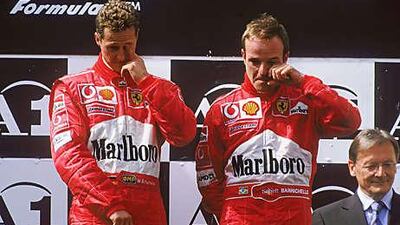Luca di Montezemolo, the Ferrari president, was in no mood for repentance when he delivered his regular post-grand prix sermon earlier this week. "The interests of the team come before the individual," he said in defence of the controversy that led to an outcry among other teams, pundits and fans.
Much ink has been spilt in the wake of last Sunday's German Grand Prix, when Ferrari drivers Fernando Alonso and Felipe Massa swapped places to enhance the former's Formula One title prospects, but they broke a rule - team orders that influence the outcome of a race - that should not exist. It came into force in 2002, following a clumsy piece of race manipulation on Ferrari's part after Rubens Barrichello slowed down on the run towards the finish line in Austria to allow Michael Schumacher to go past, but the practice has continued ever since - and it was only Ferrari's gauche handling of the situation that caused such a furore.
During the 1990s the FIA, motorsport's governing body, wanted to outlaw traction control, but declined to do so because the regulation would be impossible to police - and yet the same usually applies to team orders. In 2007 Massa dominated the Brazilian Grand Prix, the final round of that season, before slowing subtly during the pit-stop period, to let former teammate Kimi Raikkonen take the lead.
The Finn's subsequent victory was enough to secure the world championship by a solitary point - and nobody complained because it would have been unthinkable for any team to behave otherwise in such circumstances. With all the hot air still fresh, meanwhile, another motor race is about to break out. This weekend's Hungarian Grand Prix will be the last before the sport's extended summer break. Ferrari have not won at the tight, twisty Budapest circuit since 2004, but their present car's appetite for slow and medium-speed corners should enable the team to challenge serial pace-setters Red Bull-Renault, as they did in Germany.
McLaren have a strong track record in Hungary - they have won four of the past five races and their current driver, Jenson Button, won the other when he was driving for Honda - and continue to lead the title chase, but Martin Whitmarsh, the team principal, acknowledges that their advantage remains potentially brittle. "We're under no illusions that our pace relative to our rivals was lacking at Hockenheim," he said. "But the MP4-25 should perform better in a more dedicated high-downforce configuration."
One of the weekend's most significant moments will occur away from the spotlight's glare. Massa suffered a serious head injury during qualifying for last season's corresponding race, after debris struck him on the crash helmet, and he missed the rest of the season as a consequence. Before the cars turn a wheel, the Brazilian will be meeting marshals and medical staff to thank them personally for their prompt attention.
sports@thenational.ae

